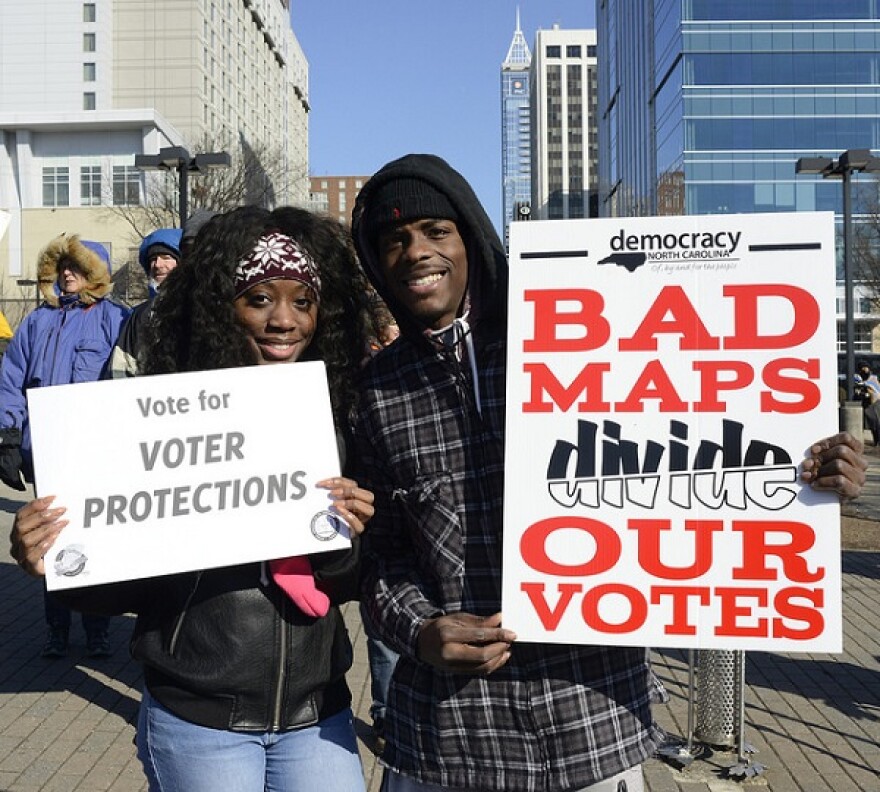By their own admission Republican lawmakers have purposefully drawn the state’s election maps in favor of their own party, sending 10 Republicans and just three Democrats to the U.S. House of Representatives.
It is perfectly legal, or at least it has been in the past. However partisan gerrymandering is getting more intense scrutiny this year.
Earlier this month a panel of three federal judges in Greensboro ruled the North Carolina congressional maps unconstitutional. Last week the Supreme Court temporarily blocked the mandated redrawing of new maps. Meanwhile a lawsuit alleging lawmakers illegally gerrymandered North Carolinian legislative districts based on race is still pending.
Host Frank Stasio talks with Steve Friedland, senior scholar and law professor at the Elon University School of Law, about what these decisions mean and what they portend for voter representation in North Carolina and the nation.
INTERVIEW HIGHLIGHTS:
On whether political gerrymandering is illegal:
This is all about the right to vote. We have this right to vote in our country that cannot be diluted. And that means that the politicians or the people who draw the maps can't make sure that our votes on the other party's side really don't count as much as the people who are on their party's side. The courts have held that when you draw maps based on race, that's unconstitutional. So that's been the existing law for a while. For the first time, however, in a long time – in 13 years – the court has said: Maybe we'll consider again our prior rulings and reconsider whether drawing it based on politics, based on partisanship, is also unconstitutional. So this is a battle of the constitution. It's a battle of powers: legislative powers and the court's powers. And who should do what? It's really unclear.
On accusations the courts are going too far:
Courts are supposed to interpret statutes and interpret the Constitution. They're supposed to be the referee. The question is whether they get into the game. And many people are claiming when they start wading into political gerrymandering, they are in the wrong sphere. They're over helping-out and working within the legislative sphere. So there's a question now whether the courts are going too far. And in a recent case that was argued in the fall, Chief Justice Roberts said: We’ve gotta watch out for our institutional reputation. We don't want people saying we've become part of the process, part of the game itself.
On legal issues raised by these gerrymandering cases:
This is becoming one of the issues of our era. It's not going away. And although I said it is part of the right to vote ... There's also a First Amendment right to express your preference for a political party. And the Court has a question: Should they even take these cases at all? Four of the justices seem to believe we shouldn't be in this ballgame at all. We should be sitting on the sidelines, watching. Four of the justices seem to say: We want this. Bring it on. And sitting right square in the middle, in the chewy center, is Kennedy. Justice Kennedy as usual is right there, and he looks like once again he's going to decide a major issue in this country.
On the way technology has changed lawmakers’ ability to manipulate the maps:
This of course has been going on since 1812. But they did not have what was called “big data.” And now they can go into a household and find out not only what they're buying at Target and Amazon but which way they voted and what's going to happen in the foreseeable future. So we’re actually putting into the algorithms almost household by household data so they can control the maps … People are going to stop voting if they know it's preordained. It's stacked in a certain way. And that is going to affect us to such an extent that it's that notion of going too far.



